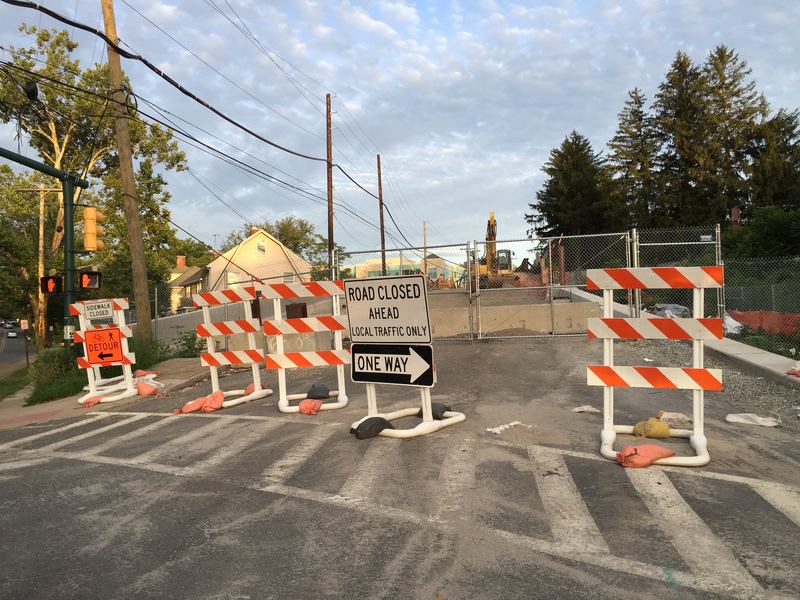
Nearly two weeks after Gov. Chris Christie halted hundreds of transportation projects around New Jersey, the political impasse in Trenton over how the state should pay for infrastructure is no closer to being resolved.
In fact, there are some signs key leaders may actually be moving further apart
Reports out of Cleveland, where Gov. Chris Christie is attending the Republican National Convention, suggest he was less than impressed with the latest Transportation Trust Fund renewal proposals put forward by state Senate President Stephen Sweeney (D-Gloucester) in private discussions.
Sweeney, for his part, appeared to be stung by Christie’s public criticism, and the Senate leader is now awaiting a counter offer from Christie even as the governor has seemed to put all state business on the back burner during the convention.
The lack of progress on the trust fund has left some advocates back home thinking that the best option may be to abandon the goal of agreeing on a long-term finance plan and to focus on cutting a deal to enact a short-term fix based on new borrowing. Adding to the pressure is a continuing shutdown of state-funded road, bridge, and rail projects that experts say is impacting the state economy by sidelining thousands of construction workers during their peak season.
The impasse started at the beginning of the month when the trust fund's five-year finance plan expired before Christie and Democratic legislative leaders could reach an agreement on a renewal. Though Christie, Sweeney, and Assembly Speaker Vince Prieto (D-Hudson) have all said they favor hiking the state gas tax by 23 cents to bring in new revenue for the trust fund, they remain at odds over tax cuts that Christie and other Republicans say should be passed along with the gas-tax hike to help mitigate its effect on taxpayers.
Christie and Prieto are supporting legislation that has already been passed by the Assembly that would cut the state sales tax by one percentage point. But Sweeney said that cut would take too much money out of the state budget — an estimated $1.6 billion by the start of the next fiscal year, according to nonpartisan legislative analysts. Sweeney is instead backing a phase-out of the estate tax and several other more modest tax cuts in addition to the gas-tax hike.
Sweeney said he met face-to-face with Christie last week to swap some new ideas about ending the impasse and was awaiting a response from the governor. But State House reporters who caught up with Christie earlier this week in Cleveland asked him about the discussions, and a www.northjersey.com report quoted the governor calling Sweeney’s proposals “ridiculous.”
“What he proposed to me the other day was unacceptable, and he knows it,” Christie said, according to the same story.
Richard McGrath, a spokesman for Sweeney, said in response that it was “unfortunate” that Sweeney had to get the governor’s response to his proposal in “a roundabout way through the media.”
McGrath added: “That type of response does little to solve the need for a renewed [Transportation Trust Fund]. The governor had promised him a counter-proposal at the meeting, and the Senate president is still anxiously waiting for the governor to live up to his promise.”
The back and forth between the two leaders comes more than a week after Christie ordered a shutdown of state-funded road, bridge, and rail projects in all 21 counties to ensure that resources were preserved for essential work.
A study released earlier this month by the American Road & Transportation Builders Association estimated the shutdown would directly impact up to 1,700 construction workers and nearly $2 million in wages. Another 1,500 jobs in other industries would also be hit, according to the study.
The shutdown is also affecting asphalt plants with increased costs but reduced revenue, according to a recent statement issued by the New Jersey Asphalt Pavement Association.
With no end in sight to the impasse, many in Trenton are beginning to believe that adopting a short-term deal with no tax changes that’s based only on borrowing may be the leaders best way out.
During a news conference held across the street from the State House yesterday, members of the Better Choices for New Jersey coalition floated the idea that lawmakers consider approving temporary borrowing for transportation projects if Christie is going to remain dug in on his demands for a sizable tax cut.
“It’s very clear to us that what he’s trying to do is destabilize and shrink New Jersey’s government,” said Analilia Mejia, executive director of New Jersey Working Families, which is a member of the coalition.
Although New Jersey is already deep in debt, they said taking on a little bit more would be a better option for lawmakers than passing tax cuts that would take significant funding out of the budget, undoubtedly impacting core priorities like education, healthcare, and environmental programs.
“It might be the only option,” said New Jersey Citizen Action’s Dena Mottola Jaborska.
They also challenged leaders to identify exactly what programs they would cut if they remain adamant that a tax cut must be passed along with a trust fund renewal plan, saying they are sending lists of programs and red pens over to lawmakers’ offices in the Trenton State House to make their point.
That drew a response from Prieto yesterday, who said in a statement that “difficult budget decisions are made each year on what to fund and how to fund it.”
“New Jersey needs a viable transportation fund or else we risk economic disaster that will slam the poor and middle-class hardest,” Prieto said. “We need a viable transportation fund to grow our economy, and anyone who thinks the Assembly would cut school aid, required benefit payments, or programs vital to the middle-class and poor under my leadership is ignoring my record.”